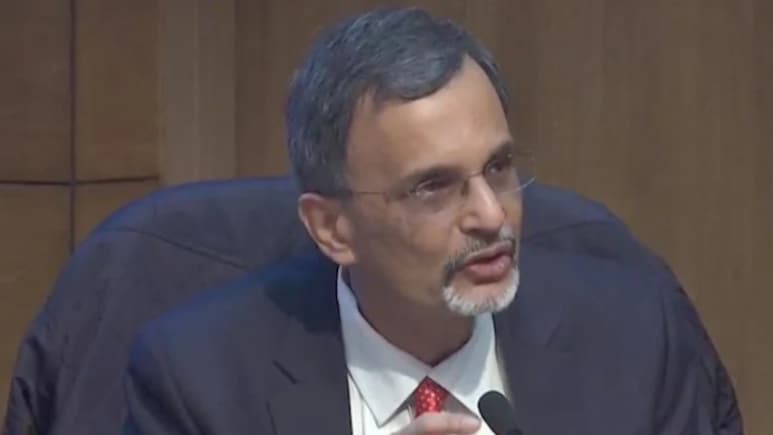
- Chief Economic Advisor said US tariff challenges on India expected to ease in one or two quarters
- CEA said tariff issues should not blind to challenges, including reliance on one country for critical minerals
- Amid US tariffs, the CEA urged the private sector to do more
Chief Economic Advisor V Anantha Nageswaran on Wednesday said US tariffs-related challenges will dissipate in the next one or two quarters, and urged the private sector to do more as the country navigates through other longer-term challenges.
He attributed the growth slowdown in FY25, which saw a deceleration to 6.5 per cent from FY24's 9.2 per cent, to tight credit conditions and liquidity issues. The right agriculture policies can add 25 per cent to real GDP growth, Nageswaran added.
On the US tariffs, the CEA said it is the second and third order impacts, which will flow once sectors like gems and jewellery, shrimps and textiles have taken the first order brunt, that will be "more difficult" to tackle.
The government is aware of the situation and conversations with the impacted sectors have already begun, Nageswaran said, adding that one will hear from the policymakers in the coming days and weeks but people have to be patient.
With speculation on whether US officials will visit India for trade talks later this month as reported, Nageswaran said the upcoming meet in Alaska between US President Donald Trump and his Russian counterpart Vladmir Putin is likely to influence the outcome.
Declining to spell out any details on the trade negotiations between India and the US, the academic-turned-advisor said things are very fluid at the world stage right now with relations swinging from cooperation to stalemate, and spelled out his expectation of the impact of 50 per cent US tariff on Indian exports.
"I do believe that the current situation will ease out in a quarter or two. I don't think that from a long-term picture, the India impact will be that significant but in the short run, there will be some impact," he said.
He said no one can guess the exact reasons why President Donald Trump chose to slap the high tariffs on India, wondering if it's the fallout of Operation Sindoor or something even more strategic.
However, the CEA said the focus on tariff-related issues should not blind us to more "important challenges", including the impact of artificial intelligence, reliance on one country for critical minerals, and their processing and strengthening of supply chains.
He exhorted the private sector to do more "as we navigate these longer-term challenges, promising that public policy will play the facilitator's role".
"Private sector also has a lot of thinking to do, given the massive strategic challenges we face in the coming years... the private sector also has to think about the long-term rather than the next quarter, which is what might have led to many of the challenges we are currently beginning to face," he said in the comments aimed at India Inc.
He, however, did not elaborate on the subject any further.
Stating that the government has allocated money towards the research purposes, he said it is now for the private sector to up their investments in the area.
The Indian youth is staring at both physical and health health issues arising from excess screen use, consumption of ultra processed food, etc, which is leading to anxieties and even suicidal thoughts among people, the CEA said, seeking the private sector's help to tackle the challenge.
He welcomed the capital expenditure put in by the private sector in FY26 and data to be released in February next year will attest to the same.
The consumption story is "quite healthy", the CEA said, pointing to the data on UPI usage. Specifically on urban consumption, he rued that there is no proper data source to capture services consumption, and added that drawing from listed companies' earnings may also not be the right measure as consumption is moving to the unlisted space.
The overall resource mobilisation in the economy is not showing any slackening, the CEA said, asking all to look at banks credit growth, commercial paper issuances, and IPO fundraising together.
On China, Nageswaran said "we also need to understand the security dimension and look at the USD 100 billion trade deficit beyond just the number." As a solution, there is a need to diversify the sources of imports and the CEA stressed that the private sector will have a role to play there.
Without naming China, he said only one country supplies critical minerals, which are essential for semiconductors, artificial intelligence tech, and added that the supply is "critically unstable".
"We cannot go from crude oil import dependence to critical minerals and ladders import dependence. Understand that crude oil (sources) at least is more diversified," he said.
"Indian policy makers must choose between accepting permanent strategic dependence on adversaries or committing the resources necessary for genuine support to independence," Nageswaran said.
Stating that AI will cause labour displacement, Nageswaran pitched for caution in AI adoption and added that "we will have to choose the areas in which we allow AI to be deployed and harnessed, and also the speed with which we do so".
There is a need to create at least 80 lakh new jobs per annum in the next 10-12 years, he added.
(Except for the headline, this story has not been edited by NDTV staff and is published from a syndicated feed.)
Track Latest News Live on NDTV.com and get news updates from India and around the world

